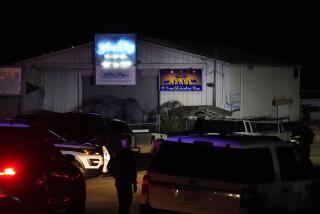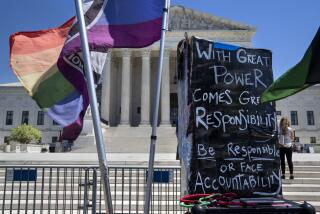Justices skeptical of farmer who planted patented Monsanto seeds
WASHINGTON — In a closely watched patent case, Supreme Court justices appeared ready to dash the hopes of an Indiana farmer who claimed the unfettered right to plant the next generation of Monsanto Co.’s genetically modified soybeans.
The justices strongly suggested in oral arguments Tuesday that they would agree with Monsanto that its patent protection covers not just the first planting but also seeds that are generated later from any plantings.
“Why in the world” would any company invest millions of dollars in creating a new seed if a farmer could buy one and freely reproduce it, Chief Justice John G. Roberts Jr. asked.
Mark Walters, a lawyer representing Indiana farmer Hugh Bowman, argued that a patent holder “exhausts” his rights after selling the product.
But the justices said that made no sense for products that are easily copied, or in the case of seeds, copy themselves. They are expected to issue a formal ruling by late spring.
A ruling for Monsanto would be a relief for companies such as vaccine makers and software makers that rely on patents and copyrights to protect their innovations from being copied and to protect their stake in products that can replicate themselves.
Farmers and Monsanto have had a sometimes testy relationship. Monsanto agents, for instance, investigate tips about the improper use of its genetically engineered seeds. The St. Louis company said it settles most cases but has filed an average of 11 lawsuits a year for the last 13 years against farmers.
Maine potato farmer Jim Gerritson, president of the Organic Seed Growers and Trade Assn., which sued Monsanto over a patent issue, said the company has a monopoly on the nation’s seed supply that should be curbed. Monsanto said in court papers that Roundup Ready soybeans represent roughly 90% of all soybeans planted.
“This is extraordinary reach for someone to have patent rights to go on for 20, 30, 50 years,” Gerritson said. Typically, patents last up to 20 years.
The National Corn Growers Assn., however, supports the current intellectual property system because it has spurred development of better crops and lowered the cost of production, said Nathan Fields, the group’s director for biotechnology and economic analysis.
“We don’t want anything that would weaken crop technology and development,” Fields said.
At Tuesday’s arguments before the nation’s high court, the only mystery seemed to be why the justices had voted to hear the farmer’s claim that he could get around Monsanto’s patent protection by buying next-generation seeds from a grain elevator.
Justice Antonin Scalia said the farmer was free to use the seeds by planting a crop. But he can’t “grow additional seeds. It’s the other seeds we are talking about,” he said.
Justice Sonia Sotomayor agreed. The patent law “doesn’t permit you to make another item. You can use the seed. But you can’t use its progeny,” she said.
Bowman, a 75-year-old farmer, said he buys Monsanto’s popular and costly soybean seeds because they are engineered to withstand the spraying of herbicides to kill weeds.
But for his second crop of the season, he tries to save money by buying soybeans from a local grain elevator. These seeds include a large percentage of Monsanto’s patented product, and the company sued him for violating its patent rights.
Lower courts ruled for Monsanto, but the Supreme Court agreed to hear Bowman’s claim that the seed maker had exhausted its patent rights when it sold its seeds.
An Obama administration lawyer joined sides with Monsanto in urging the court to reject Bowman’s claim.
“The exhaustion doctrine has nothing to do with this case,” Melissa Sherry, an assistant solicitor general, told the justices. Otherwise, a company’s 20-year patent protection would expire after “one and only one sale,” she said.
Washington attorney Seth Waxman, representing Monsanto, said the company had spent 13 years and hundreds of millions of dollars developing the herbicide-resistant seed at issue in the case. If Bowman’s claim were upheld, the value of Monsanto’s patented product would be gone “the very first time it sold a seed,” he said.
Times staff writer Ricardo Lopez contributed to this report.







